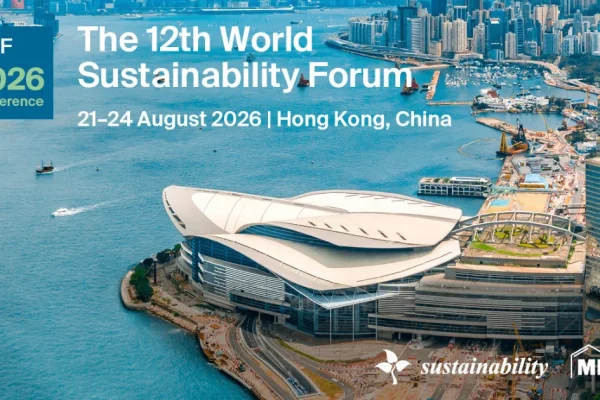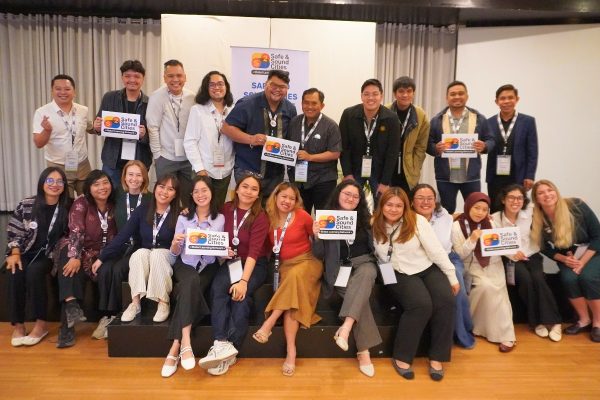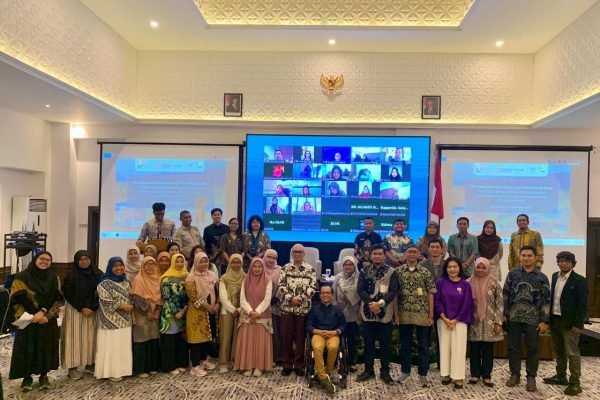The Philippine Department of Environment and Natural Resources Climate Change Service (DENR-CCS), the University of the Philippines – Los Baños (UPLB), GIZ International Services, and ICLEI – Local Governments for Sustainability Southeast Asia on 20 October 2022 held a webinar to discuss fundamental circular economy (CE) policies, frameworks, best practices, and principles applicable in the country.
Attended by over 1,000 representatives from local and national governments, academe, the private sector, and civil society organizations, the webinar highlighted the Philippine Action Plan for Sustainable Consumption and Production (PAP4SCP), the national guiding framework for shifting towards sustainable and climate-smart practices and lifestyles; as well as the recently enacted Extended Producer Responsibility (EPR) Act of 2022, a law that promotes producers to be environmentally responsible throughout the lifecycle of their products.
DENR Undersecretary Analiza Rebuelta-Teh; National Economic and Development Authority (NEDA) Agriculture, Natural Resources, and Environment Staff (ANRES) Director Nieva Natural; ICLEI SEAS Regional Program Manager Jane Alvarez, and UPLB College of Human Ecology Dean Riki Sandalo led the event.
“Circular economy action has significant contribution towards GHG mitigation, and is thus eligible for climate finance support. By drawing on our collective experience and wisdom, I believe we can all continue to support climate change mitigation while ensuring economic growth through a circular economy,’” said Usec. Rebuelta-Teh.
Circular Economy as a concept, national framework, and policy
Dr. Rex Demafelis, Chair of the UPLB Interdisciplinary Life Cycle Assessment Laboratory introduced CE as a concept, citing the EPR Act’s definition of CE as “…an economic model of creating value by extending product lifespan through improved design and servicing, and relocating ways from the end of the supply chain to the beginning.”
He likewise emphasized CE as an effective strategy to mitigate climate change and conserve natural resources as it involves recycling and reusing products beyond their traditional lifespan. This, versus the traditional linear economy where products eventually end up as waste.
NEDA ANRES Director Natural discussed the PAP4SCP which provides a holistic and integrated approach for the adoption of low carbon development, green technologies, and circular economy.
According to Director Natural, the framework includes four priority actions, specifically: (1) develop and adopt green technologies and circular economy solutions; (2) create business models for waste minimization and use of secondary raw materials; (3) conduct product life cycle analyses to assess environmental impact of products; and (4) pursue choice editing and choice influencing strategies.
These are geared towards accelerating green goods and services, and sustainable and climate-smart practices and lifestyles.
Juvinia Serafin, DENR EMB Chief of the Solid Waste Management Bureau, presented the overview and framework of the Ecological Solid Waste Management Act of 2000 (RA 9003) and its first amendment, the EPR Act.
Serafin explained that the EPR Act involves “product redesigning to efficiently utilize continual use of resources through sharing, reusing, serving, leasing, relocating waste from the end of the supply chain to the beginning, resulting to an almost close loop system.”
She also emphasized the necessity of properly implementing RA 9003, waste recovery, and recycling across both the public and private sectors to meet the goals of the EPR Act.
Insights from LGUs, NGAs, and the Private Sector
Architect Donna Tabangin, Baguio City Planning and Development Coordinator, shared her experience on using Ganbatte, a tool developed by Circle Lab for Cities and ICLEI that can provide a city with the necessary data, knowledge, and tools to achieve its climate goals through the circular transition.
Ganbatte has helped Baguio City assess how its mobility system is performing against the Circular City Actions Framework consisting of 5Rs: rethink, regenerate, reduce, reuse, and recover.
To share solutions from the private sector, Green Antz Builders Marketing and Communications Strategy Head Rafael Dionisio tackled technologies that put into action reducing, reusing, and recycling.
One of the innovations produced by Green Antz is the Eco Hub, a facility that acts as a plastic waste collection point, recycling facility, and manufacturing plant for green building materials such as ecobricks made from waste plastics.
Representing the Department of the Interior and Local Government Manila Bay Clean Up, Rehabilitation, and Preservation Program, Project Development Officer Marla Clarisol Agas explained the possible challenges of local government units in mainstreaming circular economy and implementing the EPR Act.
She highlighted the need to develop guidelines for the LGUs’ partnership with buy-back centers, junk shops, and informal waster collectors which support the function and operations of village-based materials recovery facilities.
Agas also stressed the need to continuously capacitate LGUs in complying with RA 9003 considering that a new political administration can render changes in staffing.
The last segment of the discussions focused on tools, best practices, and a circular economy framework.
Dr. Johannes Paul, GIZ Sector Project Leader on Circular Economy for the Philippines, introduced the EPR Toolbox that provides knowledge, definitions, and methods to support the establishment of EPR in low- and middle-income countries. Dr. Paul also introduced an ASEAN-German cooperation project on conserving marine environment and coral reefs by reducing waste leakage to seas of select countries, including the Philippines.
The project’s scope includes supporting the development of national measures for waste leakage reduction and translating them into strategies at the local level; and involving the private sector to lessen waste generation and leakage.
ICLEI SEAS Senior Project Officer Ricardo Marfiga, Jr. discussed in detail the Circular City Actions Framework developed by the Circle Lab for Cities program through ICLEI, Circle Economy, Metabolic and the Ellen MacArthur Foundation.
The framework introduces cities to the range of strategies and actions available to them as they work towards circular development. Specifically, it shows where a city is in their circular economy transition, and how it should act accordingly based on several case studies and best practices.
It also supports the LGU in prioritizing which circular economy practices are suitable or adaptable to the local context.
The framework complements the use of the Ganbatte platform.
The feedback gathered from the webinar attendees will help the organizers design potential assistance anchored on interest, gaps, and opportunities.
The webinar is a pre-conference to the first National Conference on Social Development and Sustainability led by the UPLB College of Human Ecology Department of Social Development Services.
With the theme, Future Proofing Human Organizations and Social Institutions towards Inclusive Development and Human Ecological Security, the NCSDS 2022 will bring together civil society, practitioners, policymakers, researchers, academia, and experts to share and discuss research and practices that highlights social and community innovations that are founded in collaborations and partnerships by and among human organizations and social institutions (HOSIs) in gearing towards social development and sustainability.
Registration to the conference is available at https://bit.ly/NCSDS2022




